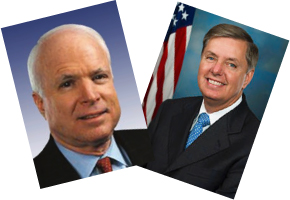Apparently Republicans were
totally blind sighted by their Election Day defeat — Mitt Romney is said to
have written only a victory speech.
Given the consistent polls forecasting an Obama victory that, to say the least, seems
mystifying. Well, speaking on NPR’s Talk
of the Nation, former Minnesota Congressman and Romney advisor Vin Weber clears
it all up. Apparently Karl Rove and others
had convinced the campaign that all the polls predicting an Obama win were
based on erroneous modeling. Speak of
wishful thinking or selectively reading into the numbers. But the story was so
convincing that everyone, Weber included, gladly drank what he described as "the
Kool-Aid". That may also explain Rove’s
own meltdown on Fox election night.
 |
| Romney conceding defeat |
Well, following his
embarrassment in delivering a totally unexpected concession, Mr. Romney has apparently
moved into the next phase of grief. He
is explaining away what happened.
As reported by Ashley Parker in the Times,
the vanquished candidate shared his analysis with members of his finance
committee. Why did he lose? Well as Parker
reports, it was because “the president had followed the ‘old playbook’ of
wooing specific interest groups — ‘especially the African-American community,
the Hispanic community and young people,’ Mr. Romney explained — with targeted
gifts and initiatives.”
And what were these gifts
with which Obama bought the election? For
“young people…a forgiveness of college loan interest”. For college age women, “free contraceptives”
and “…Obamacare also made a difference for them, because…26 years of age
and younger was now going to be part of their parents’ plan”. That’s why “young people…turned out in large
numbers, a larger share in this election even than in 2008.” Wow.
But Professor Romney wasn’t
finished. According to Parker he went
on, “…imagine for somebody making $25,000 or $30,000 or $35,000 a year, being
told you’re now going to get free health care, particularly if you don’t have
it, getting free health care worth, what, $10,000 per family, in perpetuity, I mean, this is huge. Likewise with Hispanic voters, free health
care was a big plus. But in addition
with regards to Hispanic voters, the amnesty for children of illegals, the
so-called Dream Act kids, was a huge plus for that voting group.”
One can read these remarks
as a fanciful explaining away, but to me are nothing less than a déjà
vu experience. It was also before a group of donors
that Romney let forth with his 47% tirade, again targeting moochers. At least this time the man is consistent (including continuing to lie, $10,000 in perpetuity). It isn’t only that he is totally out of touch
with the real America, but also that he clearly disdains those who aren’t part of his
“class”. In Romney’s view, it would seem that all these people
should be left to pull themselves up by their own bootstraps like, for
example he or his sons did or his grandchildren will do. Right.
We should also feel incredibly relieved that Romney never got to give that victory speech.
Perhaps the Romney campaign
drank Rove’s Kool-Aid, but one would hope they are not buying their
standard-bearer’s spin. Yes young voters
(who did turn out in large numbers), African Americans, Hispanics and Women —
the people Weber cautions his fellow Republicans are really today’s voters — responded
to Obama’s message. But they didn’t see
it as dispensing gifts or bribes. They just thought this is the way America should be headed
in the years ahead. Part of that of
course is leveling the currently very uneven playing field. They want to have the same opportunities as the Romney clan. Any one who doesn’t understand that is likely
to be yesterday’s news not tomorrow's.
Obama in his press conference laid out an olive branch to Romney, looking forward to hearing his ideas
when they meet at some undetermined time in the future. Not so with another the man he vanquished,
John McCain, and his sidekick, Lindsey Graham.
The duo served notice that they will do all in their power to thwart the
President’s second term, much as Republicans were intent on paralyzing and then
destroying Bill Clinton.
Invoking the four fallen
“great Americans” at Benghazi, the Senators laid out a two-fold strategy of
obstruction. First, they both vowed to
block the possible appointment of Susan Rice as State Secretary. In his press conference, a clearly angry
President called their characterization of Ambassador Rice, “outrageous”, so
we’ll see where that goes. Second, they
are proposing a select committee to investigate the Benghazi deaths. Let’s remember that it was the then
Congressman Graham who led the charge in impeaching Bill Clinton.
Romney seems unable to
accept that his defeat was legitimate — it all can be attributed to bribes. McCain, four years later, is still flailing
like a wounded dog. Both gave graceful
concession speeches on their respective election nights, but one wonders how
sincere they really were. In the same
way, Lindsay Graham still can’t get over being bested by Bill Clinton. His assertions during the Sotomayor hearings
that “elections count”, seems now to be forgotten. Didn't get Bill, doesn't mean I can't get Barack. Pathetic.
If the American public was
hoping for some spirit of cooperation in the aftermath of the vote, they may be
disappointed. These three Republican “leaders” have
gotten us off to a bad start. One of
them, destined for the dustbin of history, is mired in a fairy tale. The other
two, hopelessly mired in the past, are full of destructive mischief.
_____________________
I call them Transcenders. To brand them nonbelievers is to assume
religion and its particular belief system the human default. Worse it suggests that those who have left
religion behind lack beliefs. Nothing
could be further from the truth. For
more read my book.


